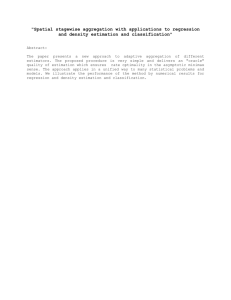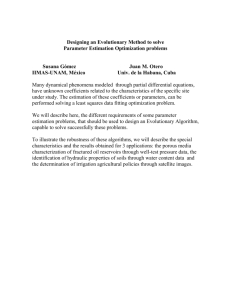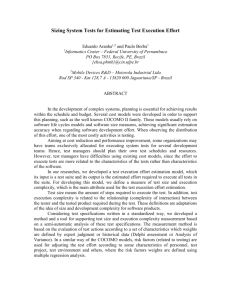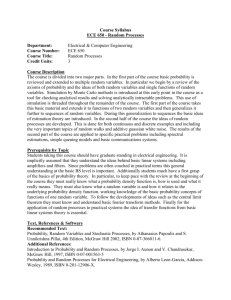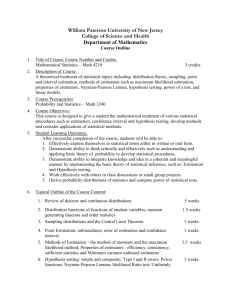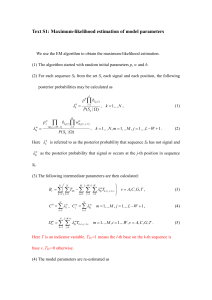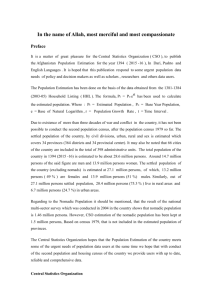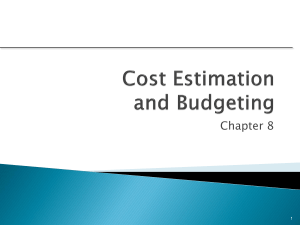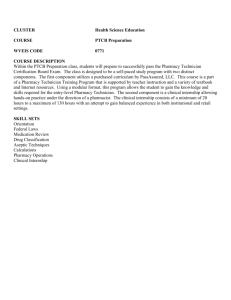Criteria for selecting a Software Estimation Tool
advertisement
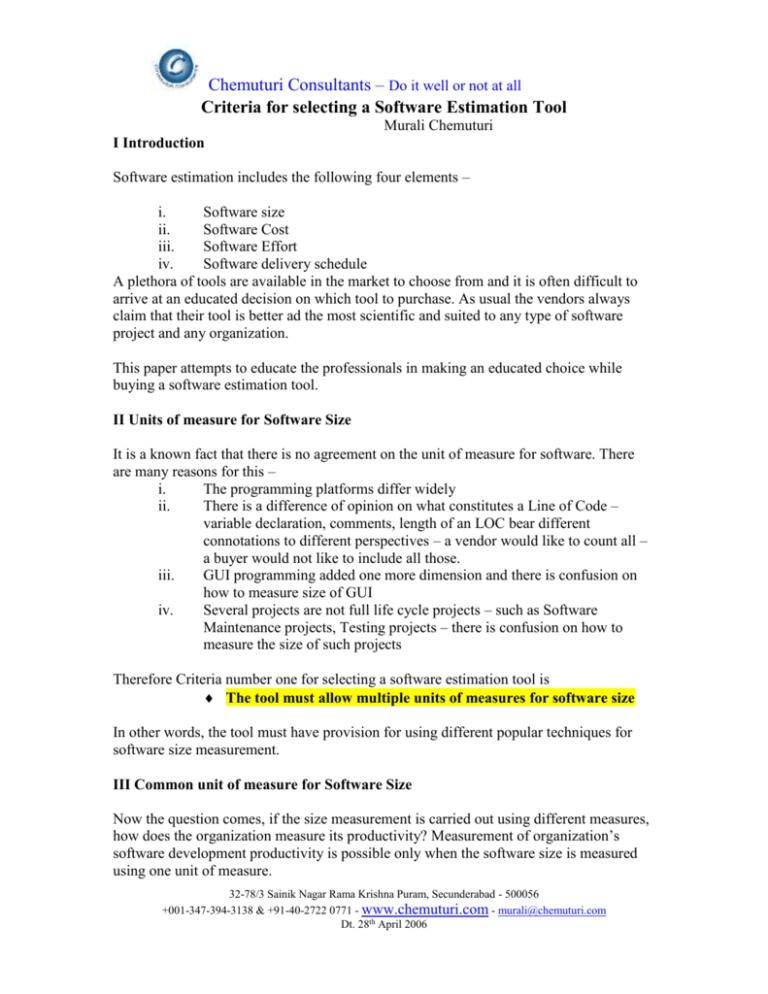
Chemuturi Consultants – Do it well or not at all Criteria for selecting a Software Estimation Tool Murali Chemuturi I Introduction Software estimation includes the following four elements – i. Software size ii. Software Cost iii. Software Effort iv. Software delivery schedule A plethora of tools are available in the market to choose from and it is often difficult to arrive at an educated decision on which tool to purchase. As usual the vendors always claim that their tool is better ad the most scientific and suited to any type of software project and any organization. This paper attempts to educate the professionals in making an educated choice while buying a software estimation tool. II Units of measure for Software Size It is a known fact that there is no agreement on the unit of measure for software. There are many reasons for this – i. The programming platforms differ widely ii. There is a difference of opinion on what constitutes a Line of Code – variable declaration, comments, length of an LOC bear different connotations to different perspectives – a vendor would like to count all – a buyer would not like to include all those. iii. GUI programming added one more dimension and there is confusion on how to measure size of GUI iv. Several projects are not full life cycle projects – such as Software Maintenance projects, Testing projects – there is confusion on how to measure the size of such projects Therefore Criteria number one for selecting a software estimation tool is The tool must allow multiple units of measures for software size In other words, the tool must have provision for using different popular techniques for software size measurement. III Common unit of measure for Software Size Now the question comes, if the size measurement is carried out using different measures, how does the organization measure its productivity? Measurement of organization’s software development productivity is possible only when the software size is measured using one unit of measure. 32-78/3 Sainik Nagar Rama Krishna Puram, Secunderabad - 500056 +001-347-394-3138 & +91-40-2722 0771 - www.chemuturi.com - murali@chemuturi.com Dt. 28th April 2006 Chemuturi Consultants – Do it well or not at all Therefore, the second criteria for selecting a software estimation tool is The tool must enable conversion of multiple units of measure into one unit of measure for software size to achieve standardization for the organization IV Software Cost Estimation There are no differences when we talk of software costing – every one agrees that it must be measured in currency of the country – be it Dollars or Euros or Rupees. While development effort in person days (PD) is the major cost source other cost items come into play while estimating the cost of software to be developed. It is likely that the additional cost items vary from organization to organization in terms of variety and unit cost. So the tool must allow maintenance of cost items (add, modify and delete of cost items data). It is also likely that the person day costs also vary from project to project. Therefore third, fourth and fifth criteria for selecting a software estimation tool is – The tool must allow software cost estimation The tool must provide for parameterization of person day cost The tool must provide for maintenance of cost items V Scheduling the software Project Basically effort is estimated for three reasons – 1. Commit a delivery schedule to the client/management/users 2. Estimate the resources required to execute the project 3. Estimate the cost of the project for funds allocation or pricing the project with objectives of cost / profit optimization We have already enumerated that the tool caters to reasons 2 and 3. While so, the first reason of developing a schedule for committing to stakeholders is by no means an insignificant one. Scheduling is a creative task and an activity that calls for human ingenuity that cannot be fully automated. Equally important is the fact that there is no accepted and standard way of apportioning so much percentage of project effort to a given phase/activity. The objectives of achieving a schedule from estimate ought to be – It should be quick It should cater to allocation of resources It should allow for allocating effort PD to different phases It should generate a schedule of sufficient detail and must be exportable to an intermediate file from which it can be taken into a full-fledged PERT/CPM packages like MS-Project and Primavera 32-78/3 Sainik Nagar Rama Krishna Puram, Secunderabad - 500056 +001-347-394-3138 & +91-40-2722 0771 - www.chemuturi.com - murali@chemuturi.com Dt. 28th April 2006 Chemuturi Consultants – Do it well or not at all Therefore sixth to eleventh criteria for selecting software estimation tool is – The tool must provide for scheduling the project The schedule must be derived from the estimated effort It must automate schedule generation to the extent feasible The tool must allow for human intervention when creating the schedule The generated schedule must have adequate detail and must be exportable to a popular intermediate file such as MS-Excel When we honestly estimate the effort in person days and then schedule it, the PD overshoots the estimated PD due to loss of time in personnel allocation, idle time, and finish–start relationships. Therefore the tool must be based on estimated PD but allow for scheduled PD to be different from the estimated PD VI Estimation for Part-life-cycle projects There are several significant projects, which are not full-life-cycle such as software maintenance, ERP implementation and testing projects. The tool has to cater to these projects too using a technique like task based estimation that is parameterized so that different project types can be defined and used by the organization. Therefore twelfth criteria for selecting software estimation tool is – The tool must cater to part-life-cycle project estimation too VII Usability Any software needs to be built with users in mind. An expert can work with any tool but the main distinguishing characteristic of a good tool is that it can produce an expertquality output even from a person of average expertise. This can be achieved by building a tool with an intuitive interface that makes the requirement of training on the usage of a tool to a minimum. This is possible with availability of GUI tools. It is also possible to use wrong controls that instead of making usage easier put a strain on the user. The tool must care more for functionality that to jazziness. A simple UI is always the better UI. Therefore sixth to thirteenth criteria for selecting software estimation tool is – The tool must be built with usability in mind with intuitive interface that makes it easier for average skilled person to quickly master it VIII Usage of popular techniques Software estimation is perhaps as old as software development itself. Some estimation techniques have become popular and are used by many organizations. Especially popular 32-78/3 Sainik Nagar Rama Krishna Puram, Secunderabad - 500056 +001-347-394-3138 & +91-40-2722 0771 - www.chemuturi.com - murali@chemuturi.com Dt. 28th April 2006 Chemuturi Consultants – Do it well or not at all are the LOC (Lines of Code), FPA (Function Point Analysis) technique and Use Case Points Technique. There are others like Object Points, Feature Points etc. Therefore sixth to fourteenth criteria for selecting software estimation tool is – The tool must provide for as many popular software estimation techniques as feasible IX Auditability Two heads are better than one is a well-known dictum and forms the basis of software inspections / reviews / walkthroughs. Therefore, it is superfluous to say that the estimated made by one person, however diligent and expert he may be, it needs to be reviewed by one more person of peer capacity. The tool must provide for making the estimate in detail so that it can be reviewed and improved upon. This detail also assists in reconciling with actuals spent on the project to draw lessons for the experience and improve the process of estimation in the subsequent projects. Therefore sixth to fifteenth criteria for selecting software estimation tool is – The tool must provide for making estimates that are auditable X Reporting capability The end result of estimating is to submit to the client/management/user. These reports should be hiding the unnecessary details but present sufficient details. Therefore, the tool must provide a summary report and a detailed report for every estimate made. Therefore sixth to Sixteenth criteria for selecting software estimation tool is – The tool should provide for generation of summary report and detailed report for every estimate made as well as a summary report of all estimations made on the tool XI Estimator Productivity It is extremely important to keep in mind the pressures on the estimators who are normally either project leaders or project managers. The tool must facilitate selection than typing as much as possible. It is also likely that projects in an organization are similar in nature but certainly not identical. Therefore, the tool must also provide for copying an existing estimate and modify it to generate a new estimate – this will save immense time of the estimators and therefore money to the organization. Therefore sixth to seventeenth criteria for selecting software estimation tool is – The tool must provide for selection from a list of choices as much as possible The tool must provide for “copy-modify-generate a new estimate 32-78/3 Sainik Nagar Rama Krishna Puram, Secunderabad - 500056 +001-347-394-3138 & +91-40-2722 0771 - www.chemuturi.com - murali@chemuturi.com Dt. 28th April 2006 Chemuturi Consultants – Do it well or not at all XII Summary Software estimation is a critical activity for an organization engaged in software development. A tool helps in generating a professional quality estimate from an average skilled person. There are a plethora of tools available for estimation. The following criteria help in making an educated choice of the appropriate tool for software estimation. 1. The tool must allow multiple units of measures for software size 2. The tool must enable conversion of multiple units of measure into one unit of measure for software size to achieve standardization for the organization 3. The tool must allow software cost estimation a. The tool must provide for parameterization of person day cost b. The tool must provide for maintenance of cost items 4. The tool must provide for scheduling the project a. The schedule must be derived from the estimated effort b. It must automate schedule generation to the extent feasible c. The tool must allow for human intervention when creating the schedule d. The generated schedule must have adequate detail and must be exportable to a popular intermediate file such as MS-Excel e. When we honestly estimate the effort in person days and then schedule it, the PD overshoots the estimated PD due to loss of time in personnel allocation, idle time, and finish–start relationships. Therefore the tool must be based on estimated PD but allow for scheduled PD to be different from the estimated PD 5. The tool must cater to part-life-cycle project estimation too 6. The tool must be built with usability in mind with intuitive interface that makes it easier for average skilled person to quickly master it 7. The tool must provide for as many popular software estimation techniques as feasible 8. The tool should provide for generation of summary report and detailed report for every estimate made as well as a summary report of all estimations made on the tool 9. The tool must provide for selection from a list of choices as much as possible 10. The tool must provide for “copy-modify-generate a new estimate ********************************************************************* Your feedback is gratefully solicited – please email your feedback to the author murali@chemuturi.com ********************************************************************* 32-78/3 Sainik Nagar Rama Krishna Puram, Secunderabad - 500056 +001-347-394-3138 & +91-40-2722 0771 - www.chemuturi.com - murali@chemuturi.com Dt. 28th April 2006
